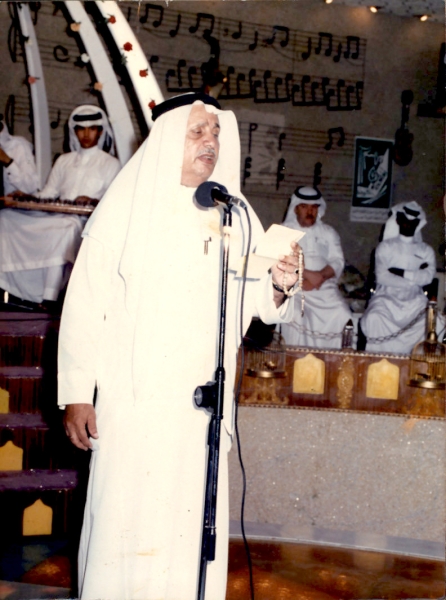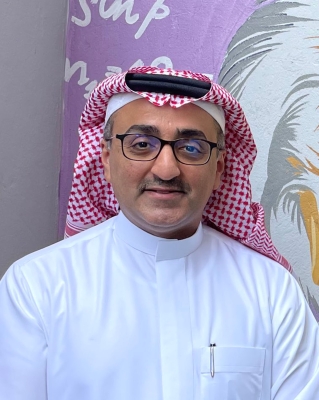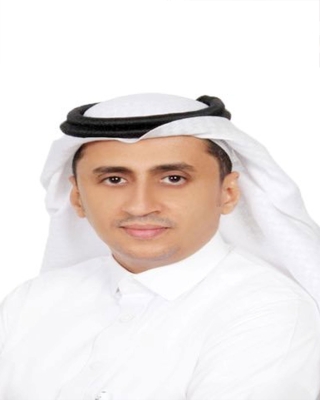
Tariq Abdul Hakim (1919 - 2012) is a musician, culture and art historian, and a pioneer of the art movement in the Kingdom of Saudi Arabia. He introduced string instruments to Saudi tunes and was named the “Dean of the modern Saudi song”. Abdul Hakim is considered the first martial music artist, and the first Arab musician to receive the UNESCO International Music Prize. Moreover, his music was the one to be chosen for all formal events and royal receptions.
Tariq Abdul Hakim was a prolific musician; composed ten symphonies throughout his life, worked on several national and historic operas in the Janadriyah National Festival for culture and heritage, and produced around 500 tunes for 104 Arab artists, among whom are Mohammed Abdu and Talal Maddah, and composed eleven music pieces. He was selected to be the chairman of the folklore department, where he established the school of Saudi martial music.
The early start of Tariq Abul Hakim
Abdul Hakim was born in Al-Muthanna neighborhood, Taif province, Makkah Al-Mukarramah. His passion for music and folklore was apparent since childhood as he excelled in singing and folk music and dance. He started school in 1926 and got into the military sector afterward. In 1952, he got a scholarship to study martial music in Cairo, making him the first Saudi to ever receive this scholarship.
The most prominent tunes of Tariq Abdul Hakim
Abdul Hakim contributed to finalizing the national anthem of Saudi Arabia as he was assigned to redistribute the anthem’s tune using modern instruments. He also produced 100 national songs, 36 pieces for the Gulf War, and a collection of songs that later became the most prominent in Saudi artistic heritage. An example of which is “Ya Reem Wadi Thaqif”, the first song he composed in 1952 and the first Arab Saudi song to be presented by “Sout Al-Khaleej” Studio. Additionally, he composed several popular songs, among which are “Abki Ala Ma Jarali”, “Lana Allah”, and “Ta'allaqa Qalbi”.
Tariq Abdul Hakim and the marching band music
Abdul Hakim graduated from the Higher Institute of Arabic Music in Egypt and established the school of martial music in the Kingdom in 1954. He is considered a pioneer as he founded a martial music museum in the capital; Riyadh, and a music institution under the authority of the General Directorate of Public Security. Moreover, he contributed to establishing the Saudi Arabian Society for Culture and Arts and participated in the operas held during the Janadriyah National Festival for culture and heritage for 17 years.
Tariq Abdul Hakim on the Arab level
Since 1965, Abdul Hakim started composing music pieces in Cairo, an example of which are “Khayali fi Al Cahera”, “Anwar Al-Madina Al-Munawwara”, “Afrah Al-Taif”, “Najd”, “Tahani”, “Munajat Abha”, “Abtal Al-Riyadh”.
His music pieces were broadcasted on the Egyptian Radio and “Voice of Arabs” Radio, for which he composed the official tune. He also collaborated with Egyptian artists, including Nagat Al-Saghira, Fayza Ahmed, Ahmad Qandil, and Karem Mahmoud.
Tariq Abdul Hakim moved to Lebanon after the sixties and settled there producing tunes for Lebanese artists, among whom is Wadih El Safi, Samira Tewfik, Souad Hashem, Samia Kanaan, Nazha Younes, and Hiyam Younes, for whom he produced “Ta'allaqa Qalbi”. He also collaborated with the Syrian artist Fahd Ballan, and composed a tune for “Salemat Biladi”; a national poem written by Ghazi Al-Gosaibi, as well as “Al-Marutin” poem written by Taher Zamakhshari, which he composed a tune for and sang.
The awards Tariq Abdul Hakim received
Abdul Hakim was awarded the UNESCO International Music Prize in 1981 to become the first Arab and the sixth musician worldwide to ever receive this award. In 1983, he was appointed the chairman of The Arab Academy of Music under the authority of The Arab League. He kept his role there for two consecutive cycles until 1987, during which he was the Kingdom representative in The Arab League. Additionally, he wrote around ten books in regard to culture, heritage, and mythology, in which he documented the history of Saudi art, folklore, and instruments.
The museum of Tariq Abdul Hakim
The Ministry of Culture announced the establishment of Tareq Abdul Hakim Music Museum in 2020 in Al-Manoufe heritage house in the historical region of Jeddah, to be open for visitors by the end of 2022. The museum contains two departments, the first one contains Tareq Abdul Hakim’s archive of personal belongings, instruments, original recordings, and a collection of images. The second department contains a research center, through which articles and research papers on Arabic Music will be presented.
The Ministry of Culture announced the establishment of the "Tariq Abdul Hakim Music Museum" in 2020, located in the historic area of Jeddah, specifically in the archaeological Al-Manufi House. The museum was inaugurated on December 28, 2023. The museum contains two departments, the first one contains Tareq Abdul Hakim’s archive of personal belongings, instruments, original recordings, and a collection of images. The second department contains a research center, through which articles and research papers on Arabic Music will be presented.
Related quizzes
Related articles


